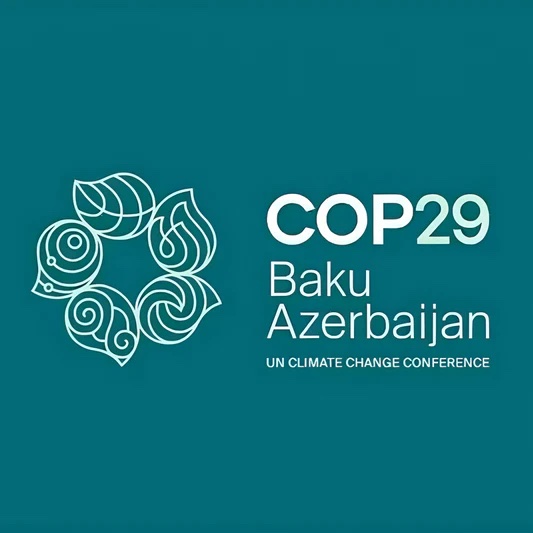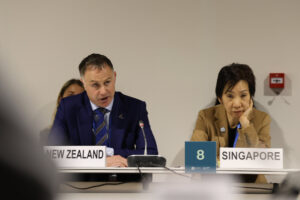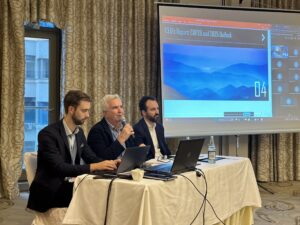COP29 update: Day 7, 18 November

Greetings from Baku!
The rain falling on Monday as we left our hotels to head for the COP venue should have warned us that all was not quite well.
As you will have read in Saturday’s update, the closing joint plenary of the SBSTA and SBI subsidiary bodies did not forward agreed outcomes from the first week of talks on all agenda items, including Article 6. Instead, numerous draft texts were forwarded to the CMA, CMP and COP with notes to the effect that “these drafts do not represent consensus”, which is SB-code for “ministers, please help”.
At midday then, the COP, CMP and CMA plenaries met all at once to consider these reports from the subsidiary bodies. The retiring chairs of SBSTA and SBI read out their doleful lists of agenda items that were approved, and the (rather more) that weren’t, and left COP President Mukhtar Babayev to pick up the pieces.
Babayev was all business, appointing pairs of ministers to consult with Parties on possible landing zones for the many outstanding items.
On the New Collective Quantified Goal, the president appointed ministers Yasmin Fouad of Egypt and Chris Bowen of Australia to consult on the structure, quantum and contributors to the NCQG on climate finance, and announced that a stocktaking plenary would take place on Tuesday evening.
And interestingly, the COP president appeared to reject the controversial outcome whereby a blocking minority of Parties appeared to punt the Mitigation Work Programme to next year, as we reported on Saturday.
“COP29 cannot and will not be silent on mitigation,” Babayev said. “We will address the matter in every direction.”
Significantly, he also told the plenary that work will not begin prepare a cover decision to round out the summit.
“It is our assessment that Parties’ priorities can and should be addressed under the mandated items for COP29, CMA6 and CMP19,” Babayev told the plenary. “I would encourage Parties to focus on work under the mandated items [for these meetings].”
And UNFCCC executive secretary Simon Stiell also urged negotiators to wrap up uncontentious items ASAP to leave time for political issues. “We can’t afford an outbreak of ‘you first-ism’,” he said. “Bluffing, brinksmanship, and pre-mediated playbooks burn up precious time. Let’s cut out the theatrics and get down to real business.”

Ministers Chris Bowen of New Zealand and Grace Fu of Singapore were tasked with taking charge of consultations on outstanding Article 6 issues. Photo: UNFCCC
In the negotiations
The opening COP/CMP/CMA plenary saw President Babayev directing ministers Grace Fu of Singapore and Simon Watts of New Zealand to consult “predominantly” on Article 6.2 international registry functionalities, and on the connection of Parties registered to the Article 6.4 registry.
Babayev also invited ministers from Brazil and the UK to support and advise the Presidency “to ensure we deliver a high-ambition and balanced set of negotiated outcomes.”
These consultations began right away after the plenary and the ministers will report back to President tomorrow evening.
Talks on remaining issues in Article 6.2 also continued on a technical level under the co-facilitation of Maria AlJishi of Saudi Arabia and Peer Stiansen of Norway, with the goal of producing a clean text by Wednesday.
On Article 6.4 president Babayev asked Kate Hancock of Australia and Sonam Tashi of Bhutan to co-facilitate further technical talks, and to produce an update and clean decision text on the best possible outcome on this session by Wednesday.
Earlier, we’d heard that the resumed discussions on Article 6.4 got bogged down in a disagreement over whether the transition of CDM credits into the new PACM should be subject to an additionality test. The EU was pushing for the inclusion, while developing country parties rejected the proposal, pointing out that using updated criteria to judge older projects would likely render many of them ineligible.
We were also heartened to hear that the EU specifically mentioned carbon markets as a source of climate finance that could be counted towards the NCQG. The talk around COP since the first day has been dominated by environmental NGOs asserting that carbon markets aren’t climate finance, but as many of our constituency have pointed out, the CDM has financed thousands of projects that are operating and contributing to mitigation, and the PACM promises to do the same.

Our Annual General Meeting was hosted by Dirk and IETA chair of the council Enric Arderiu.
Monday at the IETA Business Hub
As we suggested in Saturday’s report, the influx of fresh delegates at the start of the second week certainly amped up the energy in the delegation pavilion hall, and IETA’s hub was once again very busy.
For many of us, it was a half-day of sorts, since IETA’s Annual General Meeting took place in the afternoon, followed by a reception for US business NGO representatives. Our council reported a healthy year of membership growth and an expanding agenda, as more and more countries start the process of building up their carbon market capabilities.
The AGM elected four new council members: Sheri Hickok of Climate Impact Partners and Kavita Ahluwalia of Uniper, Emma Mazhari of Maersk and Nick Osborne of Shell.
The meeting also unanimously elected two new IETA fellows: Paulo Protasio, the former head of the Rio de Janeiro chamber of commerce and the first chair of IETA’s council, and Kay Harrison, former New Zealand ambassador for climate change and an Article 6 negotiator.
Tuesday at the IETA Business Hub
Many of the events hosted at the IETA Business Hub will be webcast – just click on the links to participate! All event times are listed in Azerbaijan time (AZT), which is three hours ahead of Central European and four hours behind Singapore time.
IETA’s BusinessHub is located in Area E, Pavilion H6, in the Blue Zone. We’re close to the pavilions of Georgia, Moana Blue Pacific and Namibia.
We are hosting three side events on Tuesday. Proceedings kick off at 0830 AZT (0530 CET) with Bayer and the Good Rice Alliance hosting a breakfast roundtable to discuss cutting methane emissions from rice cultivation. Virtual participants can watch this event here.
Value Network Ventures return to the IETA Business Hub at 1200 AZT to host a session looking at the role government policies play in catalysing carbon market growth. This session will be streamed here.
Lastly, we’re delighted to welcome the Global Carbon Pricing Challenge to our pavilion at 1300 AZT, to host a discussion on carbon pricing instrument design and lessons learned from the process of adjusting policy to local contexts. The session will feature speakers from a number of countries, with opening remarks from Guinea’s environment minister Djami Diallo. You can watch this event online here.